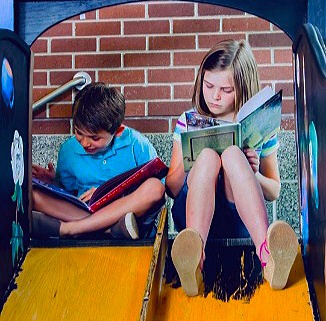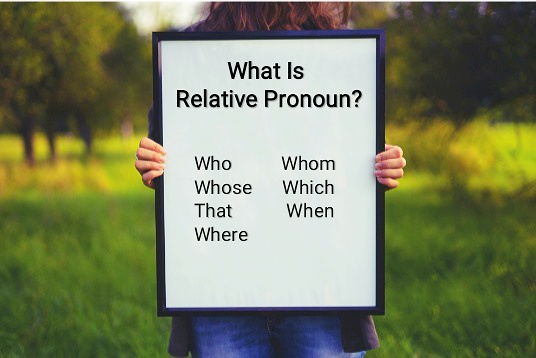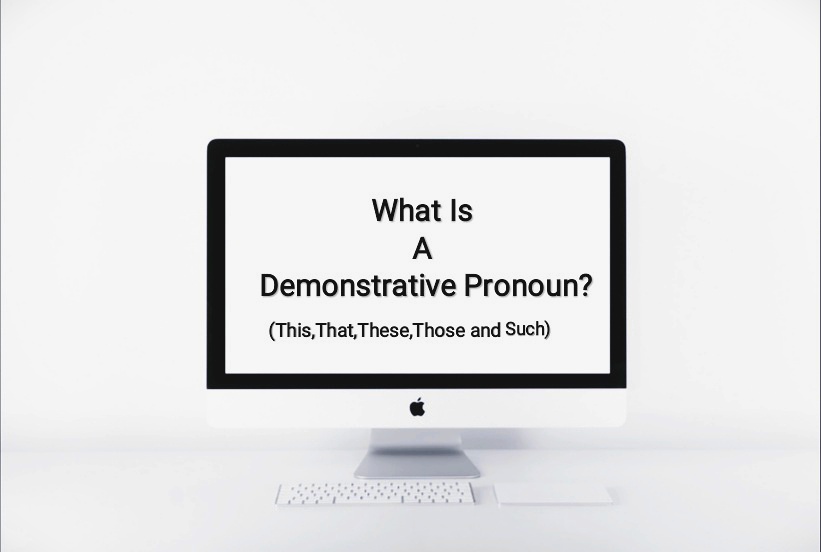What Is an Indefinite Pronoun and How to Use Them?
An indefinite pronoun is a pronoun that refers to an indefinite or/ and unknown person or thing. It is vague, not precise, and has no precedent. The most common ones are all, any, anyone, anything, each, everybody/ everyone, everything, few, many, no one, none, several, some, somebody/ someone and both.
In this section we are going to provide you with all the information you need to make indefinite pronouns completely easy to understand and be more confident when using them in one sentence.
Below you will find examples of indefinite pronouns to help clear this idea. We will examine them according to their function as singular or plural indefinite pronouns.
Below you will find examples of indefinite pronouns to help clear this idea. We will examine them according to their function as singular or plural indefinite pronouns.
What Is an Indefinite Pronoun?
An indefinite pronouns are a pronoun that refers to an indefinite entity, object or place. Indefinite pronouns can also serve as other parts of speech, depending on the context.The most indefinite pronouns are either singular or plural. Whatever, some of them may be singular in one context and plural in another.
- They plug in the hose but is anyone coming out of it? We told the players tonight but no one is here yet.
- If anyone wants a medium-sized t-shirt from the band, they can buy it.
- No one came forward to confess, so the whole class was punished.
- If anyone cared about her, there was definitely a weird way to show it.
- Does anyone know of a good place I can go to get my nails done?
- Although it can happen to anyone, it has happened to me.
- Anyone could accept a woman in a black dress as gorgeous.
- Each factory is fighting to protect its own commercial interests.
- Anyone in their right mind will know better than to do it.
- Michael handed the piece of paper to someone inside.
- With my uncle, I needed to see if anyone was interested in dating.
How to Uses Indefinite Pronouns?
An indefinite pronoun usually replaces a noun. It does not have a "specific" subject, but is obscure, so it is called an indefinite pronoun.Singular Indefinite Pronouns
Listed below are some of the pronouns. Everyone thinks it can be plural, doesn't it? Nevertheless, any pronoun ending in -one is considered singular. Similarly, pronouns that end in (such as "all") are considered singular.
- Everyone wandered aimlessly, wondering what would happen to the spaceships that otherwise occupied the clear blue sky.
- At Thanksgiving dinner, everyone brings a plated dish to complete the meal.
- When I looked around my house, I saw nothing out of the ordinary.
- One great thing about that cabin is that everything is included.
- Someone came and whispered in my ear, but when I turned around, no one was there.
- Anyone who has lived in the city will never accept the peace of the country.
- After the festival, everyone was invited back home to party.
- Anyone who came knew something terrible had happened here.
- I didn’t see anybody I knew while traveling the mall.
Plural Indefinite Pronouns
One way to distinguish between plural or/ and singular indefinite pronouns is to test the use of verbs. The plural indefinite pronouns always or all-times require a plural verb. Meanwhile, singular indefinite pronouns always or all-times require a single verb.
- There are some people who have the power to force others to do what they want, others have the power to do nothing but follow.
- After I paint my walls deep shades of purple and place jet black carpets, some may find my room very dark.
- After the story of the plane crash made headlines, many people called for information from their loved ones on the flight.
- Very few people came to see Crabby the old woman in the corner, many wondered if anyone cared for her (singular) at all.
- Very few people came to the wedding after the bride melted down and hit her family and friends.
More Examples of Indefinite Pronouns.
"All"
- All was well there.
- All people are mortal.
- All children love to play.
- All faults are forgiven.
- All people are generous.
- All the new books are wet.
- All have been calculated.
- All the water has dropped.
- All has to sit in the lobby.
- All that shines is not gold.
- All the clothes are wet today.
- All goes well with the world.
- All of us are ready to go here.
- All the boys are missing today.
- All of the news papers are wet.
- All specializes in their chosen field.
- All were late to the birthday party.
- All children love to play kanamachi.
- All of the students were present there.
- All the students are not absent today.
- All is welcome if they want to attend.
- All students are sitting in the classroom.
- All are there waiting for the show to start.
- All are welcome to come to the party tonight.
"Any"
- Is there any left?
- Any press is not a good press.
- Any can ask for anything.
- Any student can do it.
- Any fool can do that.
- Any work left, I think.
- Any lie destroys people.
- Any boy can play on the field.
- Any of the correct solutions.
- Any skill is beneficial for the job.
- Any workmen waiting to close work.
- Any teachers waiting to start classes?
- Any children can dance on the occasion.
- Any workers are waiting to stop working.
- Any experience is beneficial for the job.
- She doesn’t think there are any left.
- Smith wanted some, but I do not have any.
- Does any man have that sin?
- You can buy this pen from any store.
- Haven't seen any relatives yet?
- Did you meet any relatives at that time?
- Didn't I see any clothes?
"Anyone/ Anybody"
- Anyone fool can do it.
- Anyone can see it clearly.
- Anyone can clearly see this TV.
- Anyone can practice yoga here.
- Anybody can practice yoga in this field.
- Anybody interested in dating my cousin.
- Anyone can see that this is a terrible accident.
- Can anyone tell me why the game will happen again?
- Can anyone tell where the dog went?
- Has anyone seen my cat and dog?
- Can anyone tell me the time now?
- Can anyone name this place?
- Has anybody seen my pet animal?
- I swear I won't tell anyone.
- Is anyone at the babysitter waiting for me?
- I wonder why anyone shops in this store.
- I don't need anybody to help me with my work.
- I don't need anyone's help for my homework.
- Does anybody have the dog?
- Is there anybody like that?
- Didn't see anyone during the trip.
- Is there anybody who is not listening to me?
- Is anybody interested in dating my cousin?
- I didn't see anybody I knew during the trip.
"Anything"
- Anything is possible if you believe.
- Anything is better than nothing.
- Do you have anything to eat in the store?
- Anything is possible as long as you pay for it.
- I don’t see anything when I’m bored.
- Did they tell you anything about him?
- Didn't he/ she tell you anything about him?
- They had anything to do with what happened.
- Dad used to tell me that anything is possible.
- Is there anything to eat?
- Choose anything from the menu.
- Do you have anything to eat?
- Is there anything to eat here?
- I couldn't do anything.
- We couldn't do anything there.
- They can choose anything from the store.
- They can't buy anything from the store.
- People can't buy anything from the store.
- Do you do anything for others?
- Can't you do anything for others?
- Will you do anything to get someone else's gift.
- Do you expect to receive anything from others?
"Each"
- Each girl gave a banana.
- Each book was priced at Rs.
- Each boy will get a pen.
- Each student sat separately.
- Each child received a pen prize.
- Each of them received a medal.
- Each student was given ten notebooks.
- Each of them has some knowledge.
- Each of them has some or the other book.
- Each tree has deep roots in the soil.
- Each country has its own language.
- Each boy received an award.
- Each mango tree has new buds.
- Each boy participated in the race.
- Each of you can bring good results.
- Each mango tree has plenty of mangoes.
- Each has some ideas of their own.
- Each person in that village has the flu.
- Each country has its own nationality.
- Each member has their own abilities.
- Each boy received a book and a pen.
- Each man has to fulfill his responsibilities.
- Each boy has received some or the other award.
- We each bought a toy.
- They each bought a book and a pen.
"Everybody/ Everyone"
- Everybody likes gold rink.
- Everybody pays fifty taka only.
- Everybody is given a prize.
- Everybody likes a nice pen.
- Everybody had a beautiful time.
- Everyone is sleeping in my bedroom.
- Everyone knows it's good to work.
- Everybody has their downs and ups.
- Everybody likes to eat chocolate.
- Everyone attends my birthday party.
- Everyone works and makes a living
- Everyone knows how to drive a car.
- Everyone has made a lot of money working.
- Everyone of them was present in the class.
- Everyone had a great time at the birthday party.
- Everyone enjoyed the food and the factory.
- Everyone brought nuts to the charity drive.
- Everyone is on a good bus to travel to the park.
- Everyone is tied up to buy fruits in the market.
- Everyone was injured in the accident at the market.
- Everyone has blocked the road in road accidents.
- Everyone knows it's rude to point at someone.
- Everyone knows there is no barrier to good work.
"Everything"
- Everything we gave them.
- Everything is written here.
- Everything works beautifully.
- Everything is fine, our letters.
- Everything will be taken care of.
- Everything I told Smith that day.
- Everything is written in this letter.
- Everything you wrote in the catalog.
- Everything we gave on this occasion.
- Everything is wrong, the way we write
- Everything is going according to plan.
- Everything that happened is planned.
- Everything is funny, you are with others.
- Everything Smith knows happened here.
- Everything is fine, you are not with others.
- Everything is written in the title or catalog.
- Everything was given at this school, he said.
- Everything that happened today is correct.
- Everything will be taken care of, he told me.
- Everything is fun until it happens to someone else.
- Everything is fun until you are with someone else.
- Everything is funny, you are with someone else.
- Everything that happened happened in a planned way.
"Few/ Fewer"
- Few people love them.
- Few parents read this book.
- Few people work during the day.
- Few teachers have seen him read.
- Few people are going to market.
- Few people have seen him play before.
- Few people smoke nowadays.
- Few people nowadays do not smoke.
- Few women are going shopping today.
- A few days ago, that happened.
- A few days ago, the judge opposed them.
- A few days ago, this letter was written.
- A few pupil came to school today.
- A few eventually came into service.
- A few finally came to the service.
- Very few teachers are worried about this class.
- Very few people have seen him play.
- Very few projects are managed by me.
- Very few people are going shopping.
- Very few childs have read this book.
- Very few people nowadays use VCR.
- Very few students come to this school.
- Very few people are worried about this game.
- Very few were optimistic about this game.
"Many"
- Many expect good results.
- Many agree with their peers.
- Many think the law will change.
- Many disagree with their peers.
- Many traders like their business.
- Many will be impossible to handle.
- Many of them were present there.
- Many do not expect good results.
- Many have missed the meeting.
- Many were present at his wedding.
- Many were hoping for a better one.
- Many were hoping for better results.
- Many say the law should be changed.
- Many seem confused in his comments.
- Many are confused by their comments.
- Many traders prefer to do their business.
- Many people find it impossible to cope.
- Many are not expressing their hopes.
- Many employees like to do their job.
- Many were not present at his birthday.
- Many were present at his birthday party.
- Many think the law should not be changed.
- Many feel that the law should be changed.
- Many are not expressing their hopes here.
"No-one"
- No one likes his words.
- No one likes chocolate.
- No one likes to eat pizza.
- No one can agree with Joe.
- No one can play with them.
- No one knows until you try.
- No one likes the work of a liar.
- No one believes in a dormitory.
- No one knows what Jack can do.
- No one looked at his good work.
- No one likes to eat ice cream.
- No one can adapt to it in English.
- No one wants to work with Alex.
- No one likes to give flowers in love.
- No one can speak English with him.
- No one was related to the neighbor.
- No one is willing to go out with Mick.
- No one was at the neighbor's house.
- No one likes history classes in college.
- No one knows if he can play so well.
- No one was home when the doorbell rang.
- No one goes on vacation there in January.
- No one likes the mr smith class at school.
- No one knows what he will do until he tries.
"None"
- None of this was bad.
- None of this works well.
- None plays with the kids.
- None of the items are old.
- None can call a book old.
- None was present in class.
- None can call their work bad.
- None of them were at home.
- None of us were at the party.
- None bothered to use them.
- None of this was a bad thing.
- None gives time for children.
- None came to the English class.
- None likes to print on a printer.
- None of this has any knowledge.
- None of these options were bad.
- None likes to work with a printer.
- None spends time with bad boys.
- None of the students will get A +.
- None living in this world is happy.
- None of the children were injured.
- None of this was a bad thing, they say.
- None says the price of the dress is low.
- None of them knew about the accident.
- None says the price of a shirt is too high.
- None of the participants did their homework.
"Several"
- Several papers were lost.
- Several road signs are required.
- Several select to stay backside.
- Several cars fell into the snow.
- Several sheep were able to escape.
- Several archives have been occured.
- Several E-mails arrived this evening.
- Several books arrived this afternoon.
- Several people came for the funeral.
- Several road signs were not needed.
- Several letters arrived at 8 tonight.
- Several road signs need to be removed.
- Several people were there for the funeral.
- Several emails arrived at 10am morning.
- Several looked frustrated when it closed.
- Several people came there for the funeral.
- Several were disappointed before the start.
- Several people were not there for the funeral.
- Several showed disappointed when this closed.
- Several bikes hadn't ended up in the snowdrifts.
- Several people there have decided to stay behind.
- Several person looked disappointed before the start.
"Some"
- Some cakes are burnt.
- Some cans have expired.
- Some tools need them too.
- Some are innately talented.
- Some people work very fast.
- Some have closed the door.
- Some people are coming here.
- Some boys aren't coming here.
- Some of the eats aren't expired.
- Some of the people come here.
- Some foods had expiration dates.
- Some new scraps were not found.
- Some employers work very slowly.
- Some of the boys were very hungry.
- Some natural pictures were shown.
- Some foods have expired in the store.
- Some butter has been burnt in the fire.
- Some players were playing on the field.
- Some of her grief seems virtually real.
- Some seeds are not being bought there.
- Some boys do their homework very quickly.
- Some people know how to be in front of them.
- Some of the things wasn't past its expiration date.
"Someone"
- Someone rang the bell.
- Someone drank pure water.
- Someone is ringing the doorbell.
- Someone went to close the door.
- Someone knows where the file is.
- Someone will clean the classroom.
- Someone is walking by the window.
- Someone is walking past the house.
- Someone will come to see you now.
- Someone called us and said the word.
- Someone took a masterpiece for you.
- Someone open the door for the man!
- Someone is sleeping in my bedroom.
- Someone has to say that he has failed.
- Someone rang the doorbell very loudly.
- Someone ate pure food to curb hunger.
- Someone really came and took my pen.
- Someone bought a masterpiece for you.
- Someone will give me this English book.
- Someone should take off the man's pants!
- Someone gave me questions and answers.
- Someone gave me the exam answer sheet.
- Someone really has to come and cut my lawn.
- Someone called me and told me the wrong news.
"Both"
- Both were invited.
- Both scheduled books.
- Both like to play football.
- Both are reliable for work.
- Both have been convicted.
- Both made slight mistakes.
- Both are known as Jennifer.
- Both are well in the hospital.
- Both cars are very beautiful.
- Both graduated this semester.
- Both matched the description.
- Both have done equally wrong.
- Both have been sent elsewhere.
- Both graduated for the first time.
- Both were involved in bad deeds.
- Both have a daughter named Jarin.
- Both daughters are named Jennifer.
- Both did not do well in the final test.
- Both were sentenced to life in prison.
- Both have done well in the final exams.
- Both were invited to the birthday party.
- Both of them were invited to the birthday.
- Both match the work with the description.
- Both were sentenced to life imprisonment.
Summary: What are Indefinite Pronouns?
In English grammar, indefinite pronouns are pronouns that refer to indefinite persons, places, things, and ideas. Indefinite pronouns are usually used in impersonal constructions, or sentences that make general statements without a specific grammatical agent.Indefinite pronouns are the basis of everyday speech, but they can be a bit confusing to understand. With the knowledge in the article, You are able to define indefinite pronouns and use one in a sentence. More importantly, you can feel more confident in your ability to use these words efficiently!


















